5 Ways to Rethink How You See Time
What Four Thousand Weeks Reminded Me About Life, Work, and Paying Attention
I recently finished a book that didn’t just change how I manage my time, it changed how I think about time itself.
It’s called Four Thousand Weeks by Oliver Burkeman, and the title alone is a reality check as that’s the average amount of time a person gets on this planet: 4000 weeks. (That’s 76 years. Or 27,000+ days. Or ~3 trips to the DMV.)
But this isn’t some productivity-hacks-for-your-soul type of book. It’s not about cramming more into your calendar, it’s about choosing what actually matters (which also means actively choosing what doesn’t).
I had 157 highlights from the book and countless more notes. Here are five of my biggest takeaways:
5 Quotes to Reshape About Time Management
#1
“Life, I knew, was supposed to be more joyful than this, more real, more meaningful… We were not supposed to hate Mondays and live for the weekends and holidays.”
There’s a certain sadness in how common this is, waiting all week just to feel alive for 48 hours.
It’s something I touched on last week, how some people don’t even realize that work is something that you can actively look forward to.
We don’t need to escape our lives, we need to reshape them. Anytime you start thinking, “I can’t wait until…,” try to reframe it as “Here’s how I’m going to enjoy my time until…”
Joy isn’t a vacation perk, it’s a daily practice.
#2
“Rendering yourself more efficient … won’t generally result in the feeling of having “enough time,” because, all else being equal, the demands will increase to offset any benefits.”
As an engineer obsessed with efficiency, I’ve spent hours tweaking processes to make them just a bit faster.
On more than one occasion, I’ve wondered if I should practice “real-life trick shots” because mastering them would make me eventually be more efficient.
But Burkeman’s right—efficiency doesn’t free us from work; it feeds the machine. The better I get at replying to email, the more replies I invite.
So the answer isn’t to go faster (it’s also not just do nothing at all). It’s to opt out of the efficiency trap altogether. Don’t obsess over “maximum productivity” thinking that it’ll lead to some feeling of “being done” in the future (it won’t).
Get better at enjoying the present moment and the work that comes with it, while also being okay with what remains undone.
#3
“The attention economy is… a giant machine for persuading you to make the wrong choices… by getting you to care about things you didn’t want to care about.”
Attention, in many ways, is the only thing we really have in the present. What we choose to focus on (and inherently what we choose to ignore) in any given moment defines how we perceive the world around us.
Descartes said, “I think, therefore I am.” But in today’s world it’s “I scroll, therefore I spiral.”
The “attention economy,” is built to capture your attention, to make you spend precious time on tasks you don’t care about, buy things you don’t need, and watch videos about things that do nothing for you, 15-60 seconds at a time.
More than ever, we have to be incredibly intentional, and selective, in what we choose to pay attention to (as Neen James says, Attention Pays). Because if we can’t, someone else is dictating the life you live.
#4
“Results aren’t everything. Indeed, they’d better not be, because results always come later—and later is always too late.”
I care about results. I can’t help it. I know I shouldn’t measure my success based on how many likes these newsletters get or how many views our social media posts have, but I do.
And I lie to myself. I say, “I don’t really care about how many comments I get, it’s really just a proxy for how much I’m having an impact.”
Nope, I care about the number going up. The higher the number, the better I feel.
Speaking of which, now is a wonderful time to hit like or leave a comment :).
But Burkeman reminds us that if we tie our satisfaction to outcomes, we’ll always be chasing the next milestone. Yes, we have over 50,000 followers on our socials, but what about 100,000? Yes, one of my TEDx talks has 15 million views, but what about the others?
It’s far better to enjoy the process. The play. The awkward, clumsy, alive-in-the-moment doing of the thing.
Because if you’re always chasing the win, you’ll miss the joy of the game.
#5
“The average human lifespan is… insultingly short. But that isn’t a reason for despair… it’s a cause for relief.”
This, for me, was the exhale. The reminder that I don’t have to do everything. And acceptance that I never actually could.
Letting go of that pressure is what makes room for something better: Focus. Play. Connection. Meaning. Intention.
Which is why I think mastering the skill of humor is so critical for an enjoyable life. Call it strategic humor or smart levity or intentional fun, whatever helps you realize that whatever you “have to” or “get to” do on any given day, hour, or minute, you can choose to make it more meaningful and fun.
Because that’s the point.
Highly Recommended
If you haven’t read Four Thousand Weeks, I highly recommend it. Not as another “life optimization” manual, but as a gentle (and sometimes blunt) reminder of what really matters.
Yes, life is short. But that’s not the problem. It’s the opportunity.
(an)drew
P.S. If you want help enjoying more moments, we’re going to be launching a cohort-based course to help master the skill of humor soon. Stay tuned.



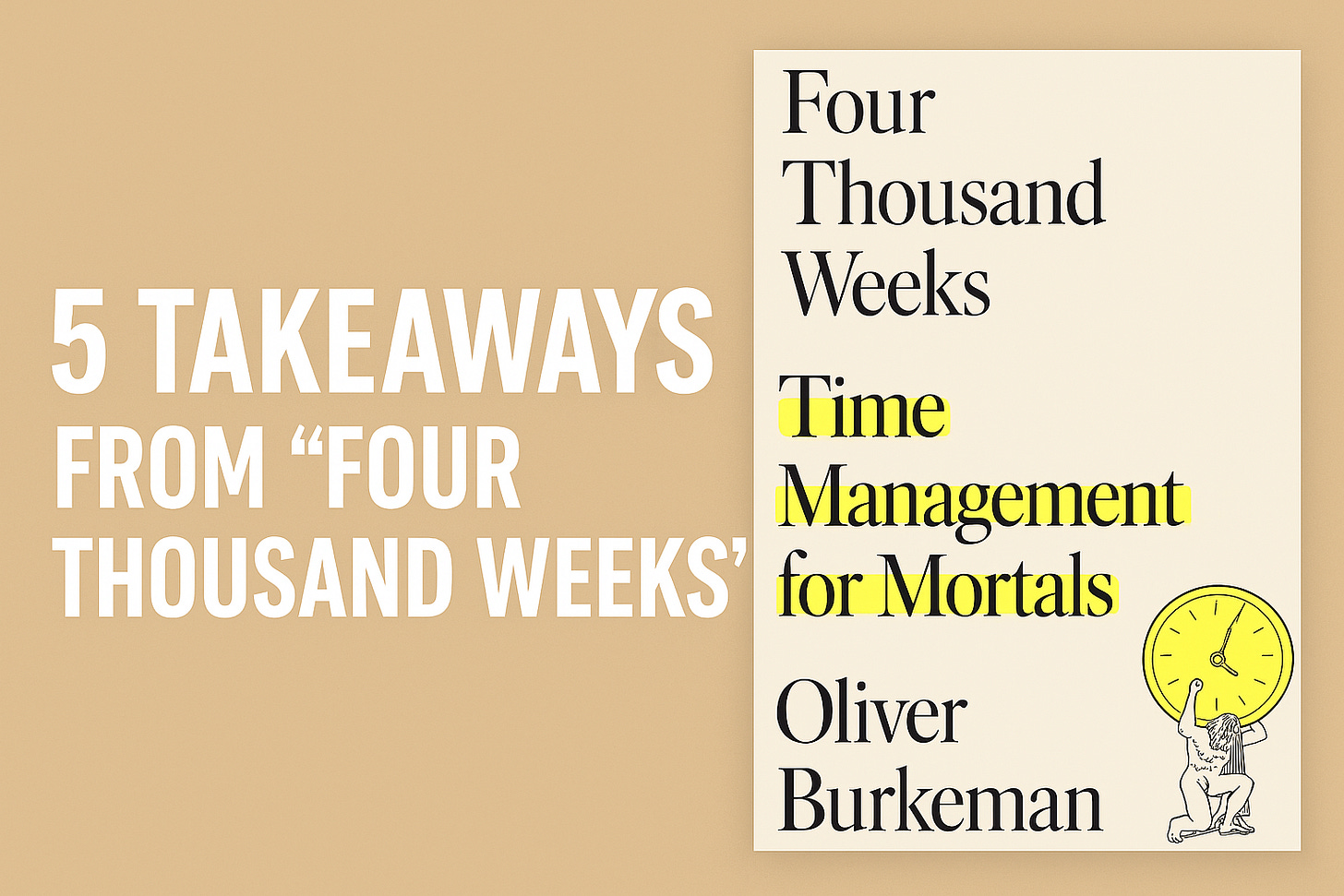
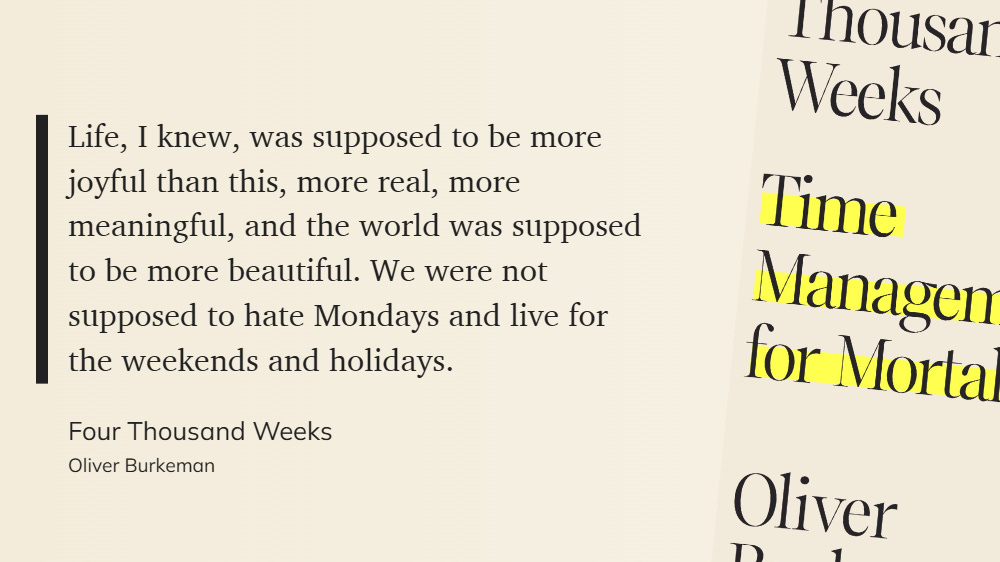
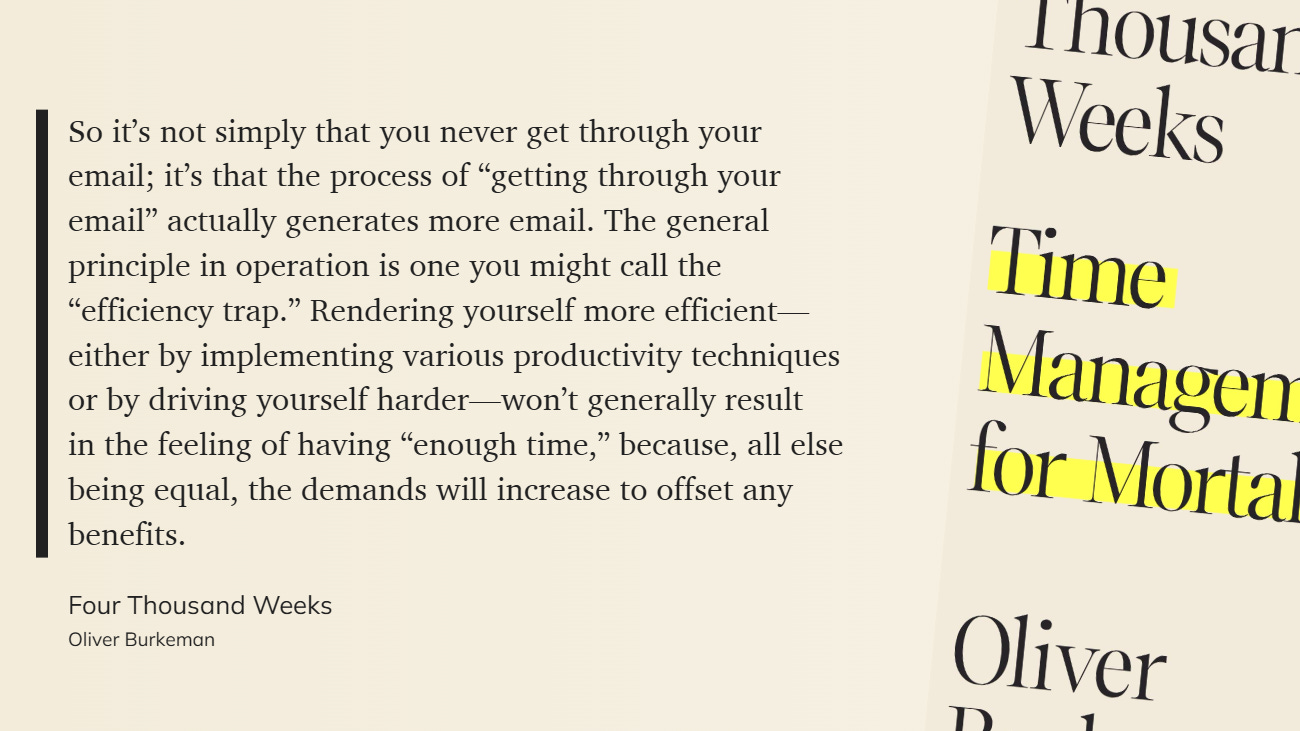
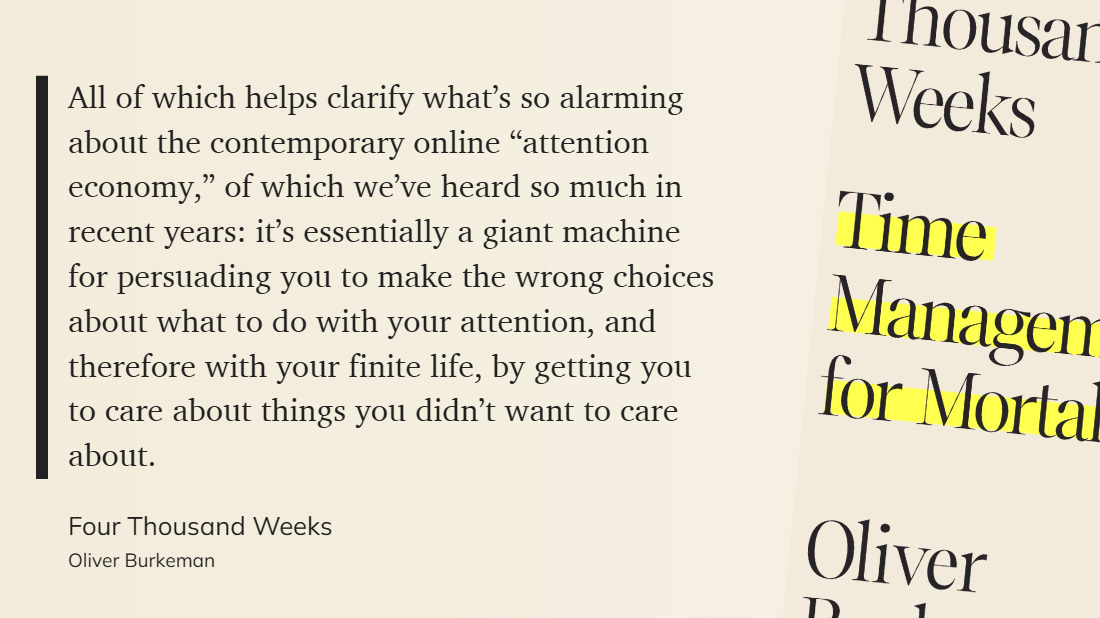
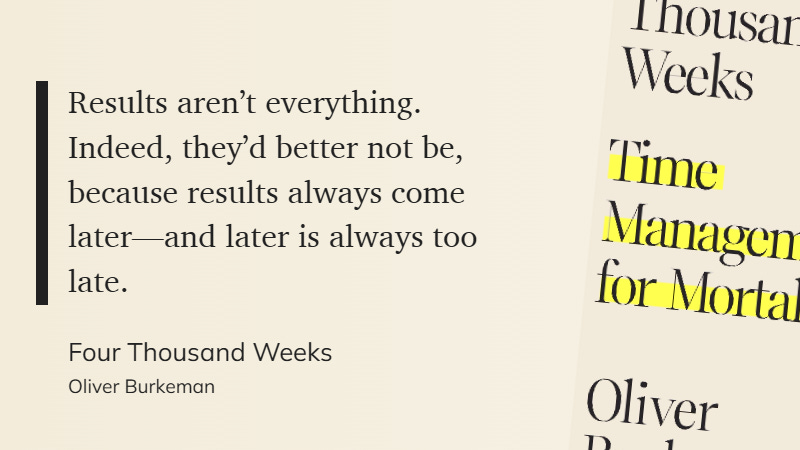
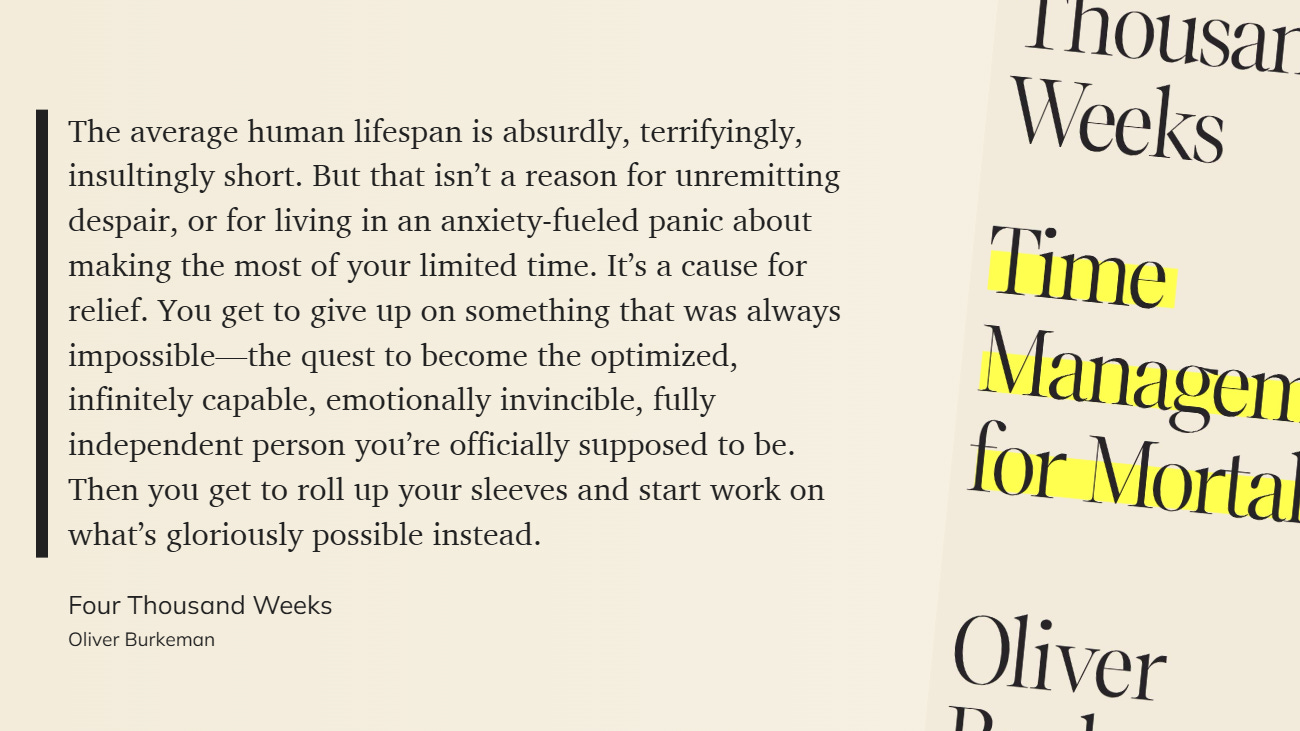
Just downloaded the audible. Came at a moment where I am reflecting on my time management (or lack thereof). Thanks for the book report.
Thanks for this, Drew! Some much needed reminders in here. Adding it to my list!